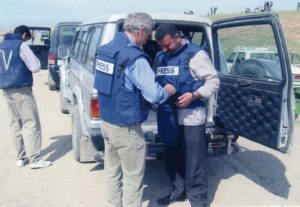When Loyalty Translates as Body Armour
In a war zone, what you don’t understand is potentially as dangerous as bullets, bombs and shrapnel.
Body armour, common sense and luck will help keep you safe from the latter. But the only protection from the perils of ignorance or misreading of local culture is a smart, loyal interpreter.

For journalists that also includes fixers and drivers, whose value often seriously exceeds the job title, and pay scale.
I cannot begin to count the number of times I was saved by a local employee’s reading of a sudden turn for the worse I hadn’t fully picked up on.
To cover start of NATO airstrikes in the middle of the night against Serb forces in Kosovo (March 24, 1999), five of us took over a couple of rooms with a balcony on the top floor of the five-star (actually three burned out and two twinkling) Grand Hotel in Pristina.

As soon as the bombing began, carloads of armed men raced through the streets, shooting at the sky and anything that moved. A couple of hours into the madness, our long-time Balkans driver Dragan Dragic climbed ten flights of unlit stairs and warned us to hide. Serb paramilitaries were in the hotel, looking for foreign journalists.
It was an extraordinary act of courage, and loyalty to us. Dragan is a Serb. If his kith and kin prowling the darkened corridors caught him, he’d be beaten him to a pulp.
DIRE CONSEQUENCES
Afghans who work with U.S. and other NATO forces face far worse if they are found out by the Taliban when the last U.S. troops leave the country.
Shortly after President Biden announced the final withdrawal, interpreters staged a desperate protest in Kabul.
“They absolutely are going to kill us,” Mohammad Shoaib Walizada, a former interpreter for the U.S. Army, said in an interview.
Gen. Mark Milley, chairman of the Joint Chiefs of Staff, acknowledged as much when he recently announced that “there are plans being developed very, very rapidly here, not just interpreters but a lot of other people that have worked with the United States,” for potential evacuation, by both the Defense and State departments.
That seemed to be news to the National Security Council, however.
A spokesperson told NBC News: “I can tell you we have no plans for evacuations at this time.” SIV (Special Immigrant Visas) were being processed in Kabul, with a focus “on ensuring that the system functions quickly and consistent with U.S. security and other application requirements.”
It wouldn’t be the first time the U.S. has become mired in bureaucracy that amounts to betrayal.
WHEN POLICY BECAME DUPLICITY
In 1996, American military and civilian personnel abandoned the “safe haven” in Iraqi Kurdistan, and an estimated 2,000 people who worked for them. American staff fled the Office of Foreign Disaster Assistance (OFDA) in the dead of night, in secret.
It took two weeks for OFDA local employees — all of who were under death threat from the Saddam regime — to organize their own evacuation. At the Turkish border, we watched as husbands, wives, and children, carrying an allotted three bags per family, stood in batches of 50, in searing heat, to have their names checked off a list.
For the most part, the Kurds who worked for the Americans were skilled, educated, often English-speaking, the upper strata of their society. A one-hundred-yard walk over a bridge and into a Turkish military camp, guarded by tanks, reduced them to a single, unenviable status: Refugee.
Their reward for serving U.S. relief operation dubbed “Provide Comfort” was to languish in a tent city while bureaucrats who’d never set foot in Iraq, and had no idea of what they had been through, mulled whether and when to let them move on and begin to rebuild their lives.
AS FOR THE REST…
Back in Kurdistan, an anguished, visibly frightened man gave me a long list of names of translators, fixers and others, along with their families, and begged me to alert the U.S. embassy in Ankara that they too, wanted out.
The embassy staffer who took my call said nothing could be done “because there are no U.S. personnel in Kurdistan to deal with them,” and, added, “if you’ve just come from there you know why.”
I asked him if the word “craven” rang any bells.
He said I was being “unfair”.
U.S. officials insist that this time they will do what is right, with the caveat that “it takes time”.
One might be forgiven for wondering if the bureaucrats understand how things work in a war zone.
Comments are always welcome. Just Click CONTACT
To subscribe for future posts scroll to the bottom of the sidebar
6 thoughts on “When Loyalty Translates as Body Armour”
Similar angle as David Zucchino’s recent story in the NY Times about the ace Afghan fighter pilot and his family. Disgraceful how we forget our responsibilities. Well done blog, Alan
Excellent post, on a topic I hope you’ll revisit. This “craven” goes way back, at least as far back as Viet Nam, and has left thousands of courageous drivers, translators and other staff in Africa, the Middle East and Asia alone and in mortal danger when everybody else goes home.
Thanks Phil. And to be fair, there have been times when we in the Press didn’t cover ourselves in glory either, like not doing maybe as much as we could have to help local employees get visas, even though ultimately that too, rests with the bureaucrats. And yes, it is s subject to which I will return.
Yeah, we’ve made it a habit to turn to the people who helped us for years and say, “Well, it’s been a slice. See ya.” and then grab a big bird home. To our complete and unending shame, we did it in 1975 to thousands of Vietnamese who’d helped us. “It takes time”???!! Pathetic.
had the same discussion today with a local roundtable group re the afghan withdrawal…the majority agreed that
america has an obligation to “take care” of the
locals who took such good care of us…
i recalled the advice given to newbies in conflict
zones-“iraqis aren’t just for christmas”…don’t
promise you’ll get them visas, etc.…
unfortunately not all heard this advice
and the reputation of the united states and
to a lesser degree cbs news took a hit…
Such a strong post, Allen. I’m sure so many of your readers would find it hard to count all the fixers/translators/drivers who showed the kind of courage and loyalty you write about. I remember being in a tight spot once and my local fixer had every chance to disappear, but he said he was “my brother” and never left my side. I’d only met him a day or two earlier. The notion of betraying that kind of friend? “Craven” is spot on.